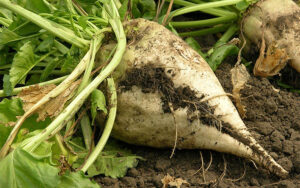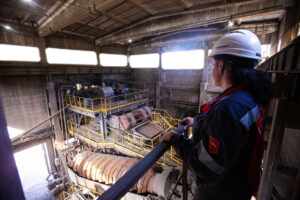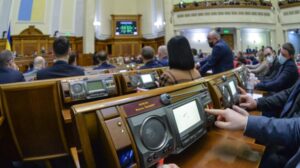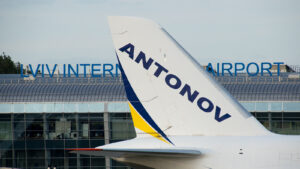
The area under sugar beet has increased by almost 20% to 250 thousand hectares during the war, which has become a good diversification option for farmers who have switched from growing grain to this crop, said Yana Kavushevska, acting chairman of the board of the National Association of Sugar Producers Ukrtsukor.
“During the war, the industry demonstrated resilience and became an island of salvation for some farmers who managed to switch from growing grain to sugar beet in time,” she said at Grain Ukraine in Kyiv.
According to Kavushevska, in 2020, 216 thou hectares were planted with sugar beet in Ukraine. However, for two years in a row, the country has been allocating 250 thou hectares for this crop, which indicates an increase of almost 20%. This is due to the areas planted by independent farmers and agricultural companies that have made a conscious choice in favor of sugar beet and saw it as a profit opportunity.
The acting chairman of the board of Ukrtsukor explained the success of the industry by the favorable situation on the world market, where sugar prices have been among the highest since 2006. In addition, it was easier for Ukrainian producers to export sugar than grain.
“There were logistical problems. Of course, sugar producers, like grain producers, are interested in keeping the ports of Greater Odesa open and working properly. But exports by land were also quite active,” she stated.
Another positive factor for the revitalization of the Ukrainian sugar industry, according to the representative of the industry association, is duty-free trade with the EU, which Ukrainian producers have actively used and increased exports.
Speaking about the imposition of restrictions on Ukrainian sugar by the EU, Kavushevska noted that Ukrainian producers have resumed exporting sugar not only to the EU, but also to the Black Sea and West Africa.
“As of May, Ukraine exported 65% of sugar to the European Union, and 35% went to countries where our sugar is also in demand. In fact, in May, Ukraine set a record for monthly sugar exports: within 30 days, we exported 108 thousand tons of sugar,” the representative of the association emphasized.
Ms. Kavushevska also noted that sugar prices are currently being corrected on the global market. She admitted that the financial results for Ukrainian producers may not be as good as before. However, for the third year in a row, sugar beet will remain among the top three most profitable crops for Ukrainian farmers, which is a good alternative to grain.
The head of Ukrtsukr also emphasized the importance of cooperation with specialized European sugar producer associations, pointed out the need to integrate Ukrainian products into the EU and reminded that the industry counts on the support of the state and its trade representatives who will negotiate the revision of autonomous trade measures and the association agreement.
Forecast of unemployment rate in Ukraine according to methodology of international labor organization until 2025

Source: Open4Business.com.ua and experts.news

Central Mining and Processing Plant (CMP, Kryvyi Rih, Dnipropetrovska oblast), a member of Metinvest Group, has overhauled the classification building of its crushing plant as part of its investment program.
According to the press release, Metinvest allocated UAH 2.4 million for the project.
It is noted that the plant continues to carry out systematic repairs to ensure uninterrupted production and avoid downtime.
It is also explained that the equipment of the classification building is a reloading unit for the transportation of dry magnetic separation tailings. The equipment includes a screen and a classifier that washes dirt from the tailings. The process produces clean crushed stone that is used in the construction of roads and railways.
In addition, it is specified that the stairs, walkways, and platforms of this area are constantly exposed to aggressive environments and interact with water, so the structures need to be updated in a timely manner.
The overhaul of the classification area took four months. The key works included strengthening the load-bearing structures of columns and beams, replacing the metal structures of equipment maintenance areas (screens, conveyors), as well as the metal structures of the fence and sump. The metal structures were also given anti-corrosion protection.
“The work performed has significantly increased the level of safety for employees, minimizing the risk of injury, and ensured the stability of the classification equipment,” said Alexander Ivashura, head of the crushing plant at the Central GOK.
Central GOK is one of the five largest producers of mining raw materials in Ukraine. It specializes in the extraction and production of iron ore concentrate and pellets.
CGOK is a part of Metinvest Group, whose major shareholders are System Capital Management (SCM, Donetsk) (71.24%) and Smart Holding Group (23.76%).
Metinvest Group’s management company is Metinvest Holding LLC.

The Verkhovna Rada has enshrined the status of English as one of the languages of international communication in Ukraine, Yaroslav Zheleznyak, a member of the Voice faction, said in a telegram.
According to him, 236 MPs voted in favor of Bill No. 9432 on the use of English in Ukraine at the plenary session of the Verkhovna Rada on Tuesday.
As reported, according to the draft law, the state ensures compulsory study of English and promotes the study of other languages of international communication in educational institutions regardless of ownership.
In addition, the bill stipulates that preschool education institutions provide compulsory English language learning for children of older preschool age. At the same time, preschool education institutions shall ensure the mandatory use of English in the educational process for children of early, junior preschool and middle preschool age.
According to the draft law, a higher education institution has the right to decide to teach one, several or most disciplines, perform individual tasks and conduct control measures in English, which is clearly stated in the description of the educational program upon admission to the university.
The draft law also stipulates that English may also be used in the Armed Forces of Ukraine and the National Guard as a language of international communication.
The draft law provides for the development and approval of a state targeted program to promote the study and use of English in Ukraine, which, in particular, should take into account the peculiarities of ensuring that cinemas (relevant cinematography entities) show foreign films in English in compliance with the requirements established by the Law “On Ensuring the Functioning of the Ukrainian Language as the State Language”.
The draft law also stipulates that foreign films in English shall be screened on a reimbursable basis by cinematography entities on a voluntary basis, but in compliance with the minimum requirements.
In particular, each cinema hall in which a cinematography entity shows films must hold at least 8 demonstrations (public screenings) of films in English during a calendar month, with at least 2 demonstrations to be held during the week at any time on a weekend or on a working day with the start of the screening after 18:00.

Japan is considering opening Asian markets to Ukrainian agricultural products, particularly chicken meat, said Ambassador of Japan to Ukraine Matsuda Kuninori at a meeting with Acting Minister of Agrarian Policy and Food Taras Vysotsky.
“Ambassador Matsuda Kuninori said that the Japanese side has confirmed the participation of its delegation in the International Conference on Ukraine Recovery (URC2024), which will be held on June 11-12, 2024 in Berlin. Japan is organizing a roundtable discussion on Ukrainian-Japanese cooperation in the agricultural sector,” the press service of the Ministry of Agrarian Policy and Food said.
The acting minister, for his part, thanked Japan for its systematic support of Ukraine and noted that the opening of Asian markets for Ukrainian agricultural products is an important step for the development of bilateral relations and business.

State Enterprise Antonov (Kyiv) announced a tender for mandatory aviation insurance services for civil aviation on May 31.
Namely for civil aviation risk insurance services (under insurance classes 1, 5, 11): aircraft insurance, aviation carrier’s liability insurance for damage caused to passengers, baggage, cargo and mail; liability insurance of commercial civil aircraft operator for damage caused to third parties.
As well as insurance of the liability of developers, manufacturers of civil aviation equipment, maintenance organizations authorized to conduct test flights for damage caused to third parties; insurance of the liability of an educational institution in the performance of training flights for damage caused to third parties. Insurance of aircraft crew members and other aviation personnel; insurance of persons who have the right to be on board an aircraft on legal grounds without purchasing tickets; insurance of employees of the customer of aviation works, employees of other organizations involved in the performance of aviation works, and persons ensuring the technological process during the performance of aviation works.
According to the message on the website of the Ukrainian Universal Exchange, the expected cost of the purchase of insurance services is UAH 5.607 million, the cost of submitting a bid is UAH 4.08 thousand.
Documents are accepted until 17:00 on June 7.